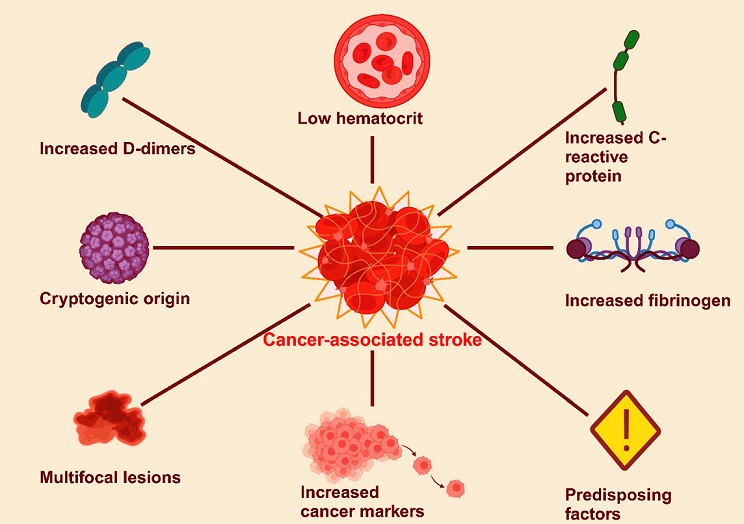Nikhil Prasad Fact checked by:Thailand Medical News Team Jan 12, 2025 3 months, 22 hours, 29 minutes ago
Medical News: Cancer and stroke, two of the most prevalent health concerns globally, are increasingly being recognized as interconnected conditions. Researchers from the Jerry H. Hodge School of Pharmacy at Texas Tech University Health Sciences Center have delved into this relationship, focusing on cancer-associated thrombosis and its link to ischemic stroke. This
Medical News report provides insights into the study, detailing how cancer contributes to stroke risk and the mechanisms involved.
 Cancer and Stroke Connection Explored in New Study
Understanding Cancer-Associated Stroke
Cancer and Stroke Connection Explored in New Study
Understanding Cancer-Associated Stroke
Cancer is well-known for elevating the risk of various complications, and stroke is emerging as one of them. The study highlights that cancer increases the likelihood of stroke through several mechanisms, particularly the formation of blood clots. These clots can travel to the brain, obstructing blood flow and leading to ischemic stroke. The findings emphasize that cancer patients are at a significantly higher risk of both venous and arterial thromboembolic events compared to the general population.
Cancer therapies, including chemotherapy, radiotherapy, and surgery, further amplify this risk by inducing hypercoagulable states, vascular damage, and inflammation. This article underscores the importance of recognizing and managing these risks to improve patient outcomes and reduce mortality.
Key Findings of the Study
The researchers identified several cancer-related factors contributing to stroke:
-Hypercoagulability and Clot Formation
Cancer creates a hypercoagulable state due to the release of procoagulant substances like tissue factor and cancer procoagulant. This increases the risk of blood clot formation, which can block arteries leading to ischemic stroke. Tumor-induced inflammation further exacerbates clotting tendencies.
-Role of Cancer Therapies
Treatments such as chemotherapy and radiation can damage the endothelium, promoting clot formation. Hormonal therapies and immunotherapies also contribute to thrombosis, making cancer treatment a double-edged sword.
-Biomarkers of Stroke Risk
The study identified several biomarkers linked to cancer-associated ischemic stroke, including D-dimer, C-reactive protein (CRP), and interleukin-6 (IL-6). Elevated levels of these markers indicate increased inflammation and clotting activity, serving as critical tools for assessing stroke risk in cancer patients.
Implications for Diagnosis and Management
Cancer-associated stroke often presents unique challenges in diagnosis. Unlike typical strokes, these events may occur without warning or traditional symptoms. Physicians are encouraged to consider stroke risk in cancer patients, especially those presenting with sudden neurological deficits.
Prevention Strategies
Managing stroke risk in cancer patients r
equires a multidisciplinary approach. Regular screening for thrombotic risks, use of anticoagulants, and control of modifiable factors like blood pressure and glucose levels are critical. Low-molecular-weight heparin and direct oral anticoagulants have shown promise in reducing stroke risks in these patients.
Advances in Treatment
New therapies targeting inflammatory pathways and biomarkers hold potential for reducing the incidence of cancer-associated strokes. Anti-inflammatory agents, cytokine inhibitors, and innovative cancer treatments that minimize vascular damage are being explored.
Conclusions and Future Directions
The study emphasizes the need for greater awareness and collaborative efforts between oncologists and neurologists to address cancer-associated stroke. As cancer treatments improve and survival rates increase, the prevalence of these strokes is expected to rise, necessitating proactive measures.
To mitigate these risks, the development of personalized treatment strategies based on molecular and genetic insights is crucial. Further research into the interplay between cancer and stroke mechanisms will pave the way for innovative solutions.
The study findings were published in the peer-reviewed journal: Biology.
https://www.mdpi.com/2079-7737/14/1/50
For the latest on Stroke and Cancer, keep on logging to Thailand
Medical News.
Read Also:
https://www.thailandmedical.news/news/covid-19-news-breaking-millions-are-suffering-from-silent-strokes-as-a-result-of-sars-cov-2-and-are-not-even-aware-of-it
https://www.thailandmedical.news/news/sars-cov-2-increases-plasma-vwf-levels-and-decreases-adamts13-activity-raising-risk-and-worsening-outcomes-of-stroke-
https://www.thailandmedical.news/news/covid-19-news-numerous-studies-and-emerging-data-are-warning-that-strokes-and-heart-failures-are-a-serious-threat-for-post-covid-individuals
